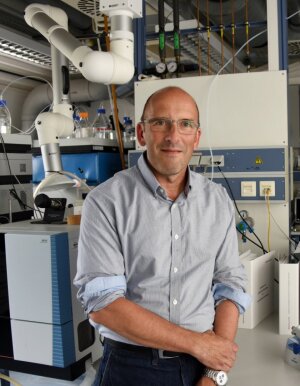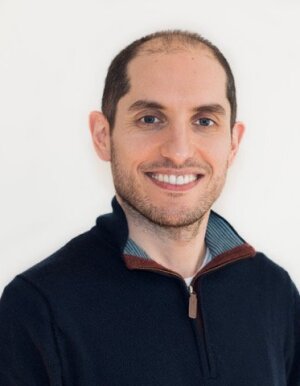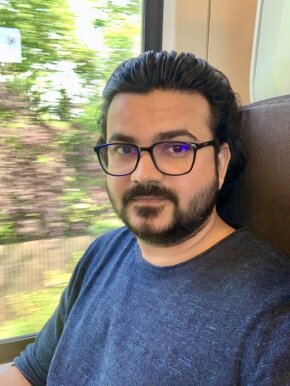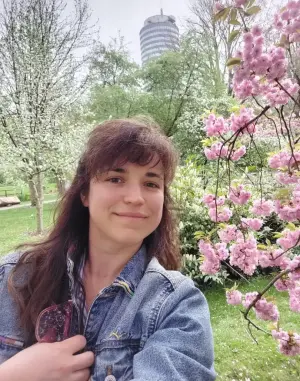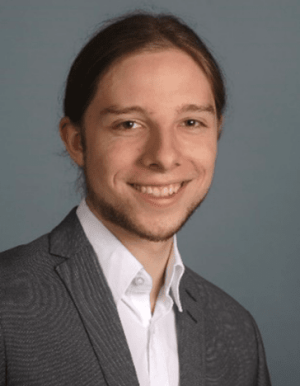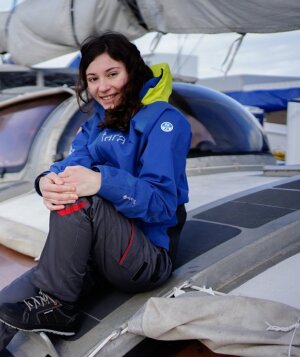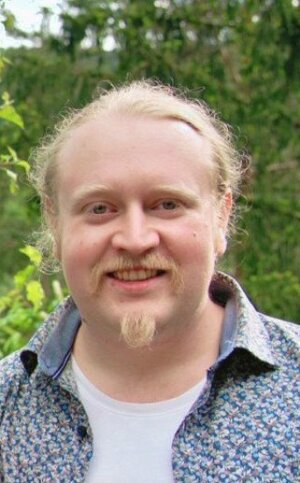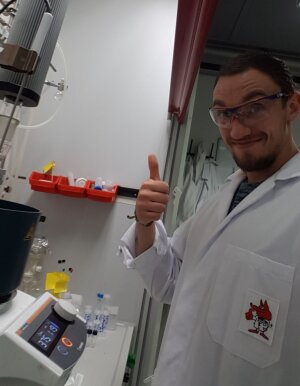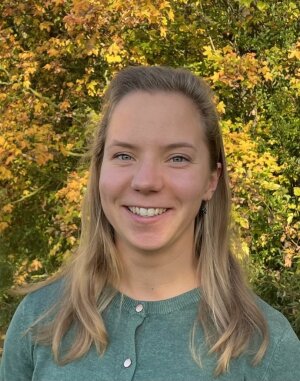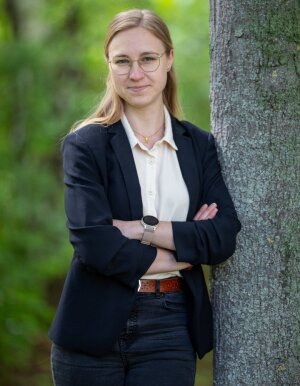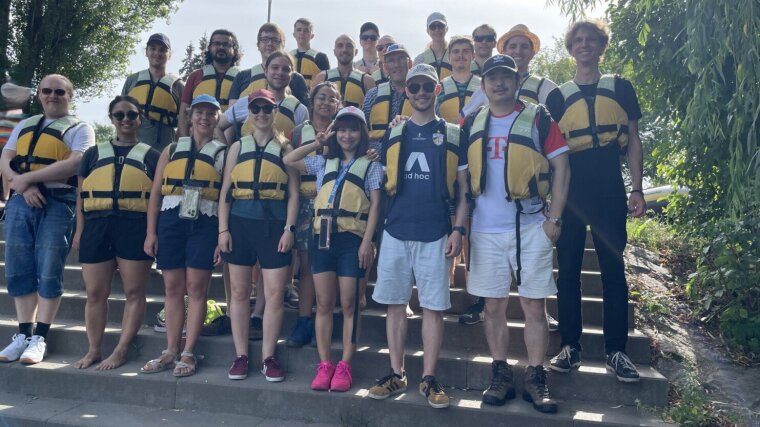
Full Professor
-
Prof. Dr. Georg Pohnert
Portrait Georg Pohnert vor MS
Image: Georg PohnertFriedrich-Schiller-University Jena
Institute of Inorganic & Analytical Chemistry
Lessingstraße 8
07743 Jena
GermanyPost and visiting address:
Friedrich-Schiller-University Jena
Lessingstraße 8
07743 Jena
georg.pohnert@uni-jena.de
Tel.: +49 3641 9-48170
Secretary
-
Sarah Tippner
Friedrich-Schiller-University Jena
Institute of Inorganic & Analytical Chemistry
Lessingstraße 8
07743 Jena
GermanyPost and visiting address:
Friedrich-Schiller-University Jena
Lessingstraße (Room 2.14)
07743 Jenasarah.tippner@uni-jena.de
Tel.: +49 3641 9-48171
Fax: +49 3641 9-48172
Group Leaders
-
PD Dr. Thomas Wichard
Friedrich-Schiller-University Jena
Institute of Inorganic & Analytical Chemistry
Lessingstraße 8
07743 Jena
GermanyPost and visiting address:
Friedrich-Schiller-University Jena
Lessingstraße 8 (Room 2.06)
07743 Jena
thomas.wichard@uni-jena.de
+49 3641 9-48184
Technical Staff Members
-
Hannes Richter
Friedrich-Schiller-University Jena
Institute of Inorganic & Analytical Chemistry
Lessingstraße 8
07743 Jena
GermanyPost and visiting address:
Friedrich-Schiller-University Jena
Lessingstraße 8 (Room 3.05)
07743 Jenahannes.richter@uni-jena.de
+49 3641 9-48951- CTA
Post-Docs
-
Dr. Udita Chandola
Friedrich-Schiller-University Jena
Institute of Inorganic & Analytical Chemistry
Lessingstraße 8
07743 Jena
GermanyPost and visiting address:
Friedrich-Schiller-University Jena
Lessingstraße 8
07743 Jena -
Dr. David Russo
Portrait Dr. David Russo
Image: Dr. David RussoFriedrich-Schiller-University Jena
Institute of Inorganic & Analytical Chemistry
Lessingstraße 8
07743 Jena
GermanyPost and visiting address:
Friedrich-Schiller-University Jena
Lessingstraße 8 (Room 2.18)
07743 Jenadavid.russo@uni-jena.de
+49 3641 9-48956I use a multi-omics approach to study the ecophysiology and molecular biology of phototrophic organisms with a focus on protein and small molecule secretion in cyanobacteria.
-
Dr. Shahrukh Abbas Siddiqui
Portrait Dr. Shahrukh Siddiqui
Image: Dr. Shahrukh SiddiquiFriedrich-Schiller-University Jena
Institute of Inorganic & Analytical Chemistry
Lessingstraße 8
07743 Jena
GermanyPost and visiting address:
Friedrich-Schiller-University Jena
Lessingstraße 8
07743 Jenashahrukh.abbas.siddiqui@uni-jena.de
My research interest focuses on the intricate interactions between bacterial communities and diatoms, with a particular focus on metabolomics. Diatoms are the key primary producers in aquatic ecosystems, engage in complex symbiotic and antagonistic relationships with bacteria, influencing nutrient cycling, carbon fixation, and ecosystem dynamics. My aim is to uncover the chemical mediators of these interactions, such as signalling molecules and secondary metabolites. Understanding how these compounds influence microbial behaviour, diatom growth, and nutrient exchange can reveal new insights into ecosystem health, biogeochemical cycles and environmental monitoring.
-
Dr. Marine Vallet
Portrait Dr. Marine Vallet
Image: Dr. Marine ValletFriedrich-Schiller-University Jena
Institute of Inorganic & Analytical Chemistry
Lessingstraße 8
07743 Jena
GermanyPost and visiting address:
Friedrich-Schiller-University Jena
Lessingstraße 8 (Room 2.18)
07743 Jenamarine.vallet@uni-jena.de
+49 3641 9-48956My research interest is understanding how algae, plants, and their symbiotic microbes communicate and interact in ecosystems. I am using omics tools to identify chemical exchanges between hosts and microbes. My research group is studying the microbes that control toxic algal blooms in aquatic ecosystems. We aim to reveal their resilience to global changes and their impact on the food web. My group is supported by the Deutsche Forschungsgemeinschaft (DFG, German Research Foundation): SFB 1127 ChemBioSys, Project number 239748522.
Doctoral Candidates
-
Justus Hardegen
Portrait Justus
Image: Justus HardegenFriedrich-Schiller-University Jena
Institute of Inorganic & Analytical Chemistry
Lessingstraße 8
07743 Jena
GermanyPost and visiting address:
Friedrich-Schiller-University Jena
Lessingstraße 8 (Room 2.05)
07743 Jenajustus.hardegen@uni-jena.de
+49 3641 9-48288I am investigating the effects of micropollutants on Ulva spp. and how the compounds interact with the alga and its associated microbiome. This allows a good assessment of the bioremediation and water treatment potential of Ulva.
-
Maia Henry
Portrait Maia Henry
Image: Maia HenryFriedrich-Schiller-University Jena
Institute of Inorganic & Analytical Chemistry
Lessingstraße 8
07743 Jena
GermanyPost and visiting address:
Friedrich-Schiller-University Jena
Lessingstraße 8 (Room 3.09)
07743 Jenamaia.henry@uni-jena.de
+49 3641 9-48954My PhD research focuses on the analysis of metabolomic samples collected during the Tara Microbiomes expedition between 2021 and 2022. Im particularly interested in the Amazon River and it's plume, a unique area where the river's freshwater mixes with the Atlantic Ocean. I am investigating the impact of large environmental gradients (salinity, temperature, nutrients...) on the metabolome of the planktonic communities present. The Amazon River, by modulating not only the specific and genetic diversity of organisms, but also their functional diversity, is a perfect illustration of the complexity of microbial communities in the environment. Finally, my subject allows me to combine several aspects of research: fieldwork, laboratory and in silico analysis.
-
Hermann Holbl
Friedrich-Schiller-University Jena
Institute of Inorganic & Analytical Chemistry
Lessingstraße 8
07743 Jena
GermanyPost and visiting address:
Friedrich-Schiller-University Jena
Lessingstraße 8 (Room 2.05)
07743 Jenahermann.holbl@uni-jena.de
+49 3641 9-48288 -
Sebastian Jeß
Friedrich-Schiller-University Jena
Institute of Inorganic & Analytical Chemistry
Lessingstraße 8
07743 Jena
GermanyPost and visiting address:
Friedrich-Schiller-University Jena
Lessingstraße 8 (Room 2.05)
07743 Jenasebastian.jan-philipp.jess@uni-jena.de
+49 3641 9-48288 -
Hannah Knappe
Friedrich-Schiller-University Jena
Institute of Inorganic & Analytical Chemistry
Lessingstraße 8
07743 Jena
GermanyPost and visiting address:
Friedrich-Schiller-University Jena
Lessingstraße 8 (Room 2.18)
07743 Jena+49 3641 9-48956
-
Maximilian Knips
Friedrich-Schiller-University Jena
Institute of Inorganic & Analytical Chemistry
Lessingstraße 8
07743 Jena
GermanyPost and visiting address:
Friedrich-Schiller-University Jena
Lessingstraße 8 (Room 2.05)
07743 Jenamaximilian.knips@uni-jena.de
+49 3641 9-48288 -
Felix Krickl
Felix Krickl
Image: Felix Kricklfelix.krickl@uni-jena.de
Following the stereoselective total synthesis of Thallusin and method development for MS quantification of this algal growth- and morphogenesis-promoting factor in the joint effort between IOMC and IAAC in Jena, the remaining goal of our project is to gain a deeper mechanistical understanding of the Thallusin-mediated iron uptake by Ulva mutabilis. Central for this investigation is the synthesis of suitable simplified model iron ligands deriving from the Thallusin molecule and the structural and molecular dynamical characterization of possible complexes. Ultimately, incubation experiments with the alga and the characterized complexes will widen the collected data about structure activity relationships, thereby elucidating molecular processes at play in this biological system.
-
Benedikt Kühnel
Friedrich-Schiller-University Jena
Institute of Inorganic & Analytical Chemistry
Lessingstraße 8
07743 Jena
GermanyPost and visiting address:
Friedrich-Schiller-University Jena
Lessingstraße 8 (Room 2.05)
07743 Jenabenedikt.kuehnel@uni-jena.de
+49 3641 9-48288 -
Tommy Melzer
Portrait Tommy Melzer
Image: Tommy MelzerFriedrich-Schiller-University Jena
Institute of Inorganic & Analytical Chemistry
Lessingstraße 8
07743 Jena
GermanyPost and visiting address:
Friedrich-Schiller-University Jena
Lessingstraße 8 (Room 2.18)
07743 Jenatommy.melzer@uni-jena.de
+49 3641 9-48956My project with the acronym „VANAPLA“ (variable analysis platform) aims to develop an automated, modular and scalable sample preparation platform. By the modular character of the platform, the sample preparation process can be individuell adapted to the respective analytical question. Automatization enables high-throughput of samples in a standardized manner, whereby the scatter of the obtained measurement results can be significantly reduced. The project is coordinated with Analytik Jena and part of the Cluster4Future innovation „ThWIC“ (Thüringer Wasser-Innovationscluster), financed by the BMBF.
-
Vera Nikitashina
Portrait Vera Nikitashina
Image: Vera NikitashinaFriedrich-Schiller-University Jena
Institute of Inorganic & Analytical Chemistry
Lessingstraße 8
07743 Jena
GermanyPost and visiting address:
Friedrich-Schiller-University Jena
Lessingstraße 8 (Room 3.04)
07743 Jenavera.nikitashina@uni-jena.de
+49 3641 9-48169My research interests are interactions within marine plankton photosymbiotic systems. I investigate metabolic interconnection between microalgae and their hosts Radiolaria with application of analytical methods, such as liquid and gas chromatography - mass spectrometry, and mass spectrometry imaging.
-
Ruchicka O'Niel
Portrait Ruchicka O'Niel
Image: Ruchicka O'NielFriedrich-Schiller-University Jena
Institute of Inorganic & Analytical Chemistry
Lessingstraße 8
07743 Jena
GermanyPost and visiting address:
Friedrich-Schiller-University Jena
Lessingstraße 8 (Room 3.02)
07743 Jenaruchicka.oniel@uni-jena.de
+49 3641 9-48953My research centers around studying Phytoplankton and the chemical cues that are exchanged within a phycosphere to better understand plankton community dynamics. During the course of my PhD I aim to identify chemical mediators involved in phytoplankton - parasite interactions. I also enjoy drinking tea, playing board games and have a special fondness for the wilderness.
-
Janine Otto
Portrait Janine Otto
Image: Janine OttoFriedrich-Schiller-University Jena
Institute of Inorganic & Analytical Chemistry
Lessingstraße 8
07743 Jena
GermanyPost and visiting address:
Friedrich-Schiller-University Jena
Lessingstraße 8 (Room 2.18)
07743 Jenaotto.janine@uni-jena.de
+49 3641 9-48956I´m interested in the analysis of DNA nucleobases and their modifications. Analytical methods based on mass spectrometry can detect methylated nucleobases from whole-genome DNA. Together with chemical hydrolysis of the DNA, which is independent of enzymatic activity that is probably influenced by certain DNA modifications, LC-HRMS enables a general survey of nucleic acid modifications in a short analysis time. I systematically optimized and validated an LC-HRMS-based method. This method now makes it possible to analyze the DNA methylome for many organisms (bacteria and eukaryotes) in complex communities.
-
Simon Redlich
Friedrich-Schiller-University Jena
Institute of Inorganic & Analytical Chemistry
Lessingstraße 8
07743 Jena
GermanyPost and visiting address:
Friedrich-Schiller-University Jena
Lessingstraße 8 (Room 2.05)
07743 Jena -
Johann Franz Ulrich
Friedrich-Schiller-University Jena
Institute of Inorganic & Analytical Chemistry
Lessingstraße 8
07743 Jena
GermanyPost and visiting address:
Friedrich-Schiller-University Jena
Lessingstraße 8 (Room 2.05)
07743 Jenajohann.ulrich@uni-jena.de
+49 3641 9-48288
Website research group -
Ruyi Yu
Portrait Ruyi Yu
Image: Ruyi YuFriedrich-Schiller-University Jena
Institute of Inorganic & Analytical Chemistry
Lessingstraße 8
07743 Jena
GermanyPost and visiting address:
Friedrich-Schiller-University Jena
Lessingstraße 8 (Room 3.11)
07743 JenaI specialize in using advanced Analytical Techniques and Biological Systems to explore defense mechanisms and metabolic exchanges in marine communities. My current focus is on studying Extracellular Vesicles (EVs) produced by diatoms when co-cultivated with various bacteria, including algicidal species.
